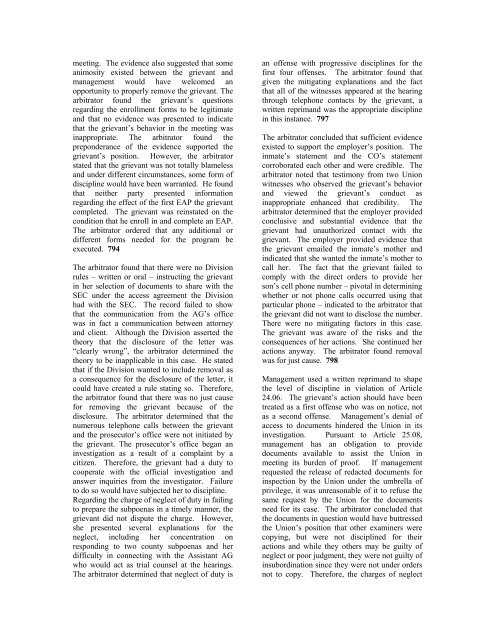by Contract Number (PDF) - OCSEA
by Contract Number (PDF) - OCSEA
by Contract Number (PDF) - OCSEA
Create successful ePaper yourself
Turn your PDF publications into a flip-book with our unique Google optimized e-Paper software.
meeting. The evidence also suggested that some<br />
animosity existed between the grievant and<br />
management would have welcomed an<br />
opportunity to properly remove the grievant. The<br />
arbitrator found the grievant’s questions<br />
regarding the enrollment forms to be legitimate<br />
and that no evidence was presented to indicate<br />
that the grievant’s behavior in the meeting was<br />
inappropriate. The arbitrator found the<br />
preponderance of the evidence supported the<br />
grievant’s position. However, the arbitrator<br />
stated that the grievant was not totally blameless<br />
and under different circumstances, some form of<br />
discipline would have been warranted. He found<br />
that neither party presented information<br />
regarding the effect of the first EAP the grievant<br />
completed. The grievant was reinstated on the<br />
condition that he enroll in and complete an EAP.<br />
The arbitrator ordered that any additional or<br />
different forms needed for the program be<br />
executed. 794<br />
The arbitrator found that there were no Division<br />
rules – written or oral – instructing the grievant<br />
in her selection of documents to share with the<br />
SEC under the access agreement the Division<br />
had with the SEC. The record failed to show<br />
that the communication from the AG’s office<br />
was in fact a communication between attorney<br />
and client. Although the Division asserted the<br />
theory that the disclosure of the letter was<br />
“clearly wrong”, the arbitrator determined the<br />
theory to be inapplicable in this case. He stated<br />
that if the Division wanted to include removal as<br />
a consequence for the disclosure of the letter, it<br />
could have created a rule stating so. Therefore,<br />
the arbitrator found that there was no just cause<br />
for removing the grievant because of the<br />
disclosure. The arbitrator determined that the<br />
numerous telephone calls between the grievant<br />
and the prosecutor’s office were not initiated <strong>by</strong><br />
the grievant. The prosecutor’s office began an<br />
investigation as a result of a complaint <strong>by</strong> a<br />
citizen. Therefore, the grievant had a duty to<br />
cooperate with the official investigation and<br />
answer inquiries from the investigator. Failure<br />
to do so would have subjected her to discipline.<br />
Regarding the charge of neglect of duty in failing<br />
to prepare the subpoenas in a timely manner, the<br />
grievant did not dispute the charge. However,<br />
she presented several explanations for the<br />
neglect, including her concentration on<br />
responding to two county subpoenas and her<br />
difficulty in connecting with the Assistant AG<br />
who would act as trial counsel at the hearings.<br />
The arbitrator determined that neglect of duty is<br />
an offense with progressive disciplines for the<br />
first four offenses. The arbitrator found that<br />
given the mitigating explanations and the fact<br />
that all of the witnesses appeared at the hearing<br />
through telephone contacts <strong>by</strong> the grievant, a<br />
written reprimand was the appropriate discipline<br />
in this instance. 797<br />
The arbitrator concluded that sufficient evidence<br />
existed to support the employer’s position. The<br />
inmate’s statement and the CO’s statement<br />
corroborated each other and were credible. The<br />
arbitrator noted that testimony from two Union<br />
witnesses who observed the grievant’s behavior<br />
and viewed the grievant’s conduct as<br />
inappropriate enhanced that credibility. The<br />
arbitrator determined that the employer provided<br />
conclusive and substantial evidence that the<br />
grievant had unauthorized contact with the<br />
grievant. The employer provided evidence that<br />
the grievant emailed the inmate’s mother and<br />
indicated that she wanted the inmate’s mother to<br />
call her. The fact that the grievant failed to<br />
comply with the direct orders to provide her<br />
son’s cell phone number – pivotal in determining<br />
whether or not phone calls occurred using that<br />
particular phone – indicated to the arbitrator that<br />
the grievant did not want to disclose the number.<br />
There were no mitigating factors in this case.<br />
The grievant was aware of the risks and the<br />
consequences of her actions. She continued her<br />
actions anyway. The arbitrator found removal<br />
was for just cause. 798<br />
Management used a written reprimand to shape<br />
the level of discipline in violation of Article<br />
24.06. The grievant’s action should have been<br />
treated as a first offense who was on notice, not<br />
as a second offense. Management’s denial of<br />
access to documents hindered the Union in its<br />
investigation. Pursuant to Article 25.08,<br />
management has an obligation to provide<br />
documents available to assist the Union in<br />
meeting its burden of proof. If management<br />
requested the release of redacted documents for<br />
inspection <strong>by</strong> the Union under the umbrella of<br />
privilege, it was unreasonable of it to refuse the<br />
same request <strong>by</strong> the Union for the documents<br />
need for its case. The arbitrator concluded that<br />
the documents in question would have buttressed<br />
the Union’s position that other examiners were<br />
copying, but were not disciplined for their<br />
actions and while they others may be guilty of<br />
neglect or poor judgment, they were not guilty of<br />
insubordination since they were not under orders<br />
not to copy. Therefore, the charges of neglect
















